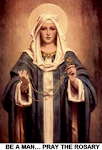Vatican Aide Reflects on Pontiff's Idea of Peace for Region
By Mercedes de la Torre
AMMAN, Jordan, MAY 8, 2009 (Zenit.org).- Benedict XVI is in the Holy Land as a self-defined "pilgrim of peace," but he hopes to bring the region more than an absence of conflict, says a Vatican aide following the weeklong pilgrimage.
Father Caesar Atuire, the delegate administrator of Opera Romana Pellegrinaggi, spoke with ZENIT about the Pope's trip, which began today in Jordan.
The Opera Romana Pellegrinaggi is the Vatican institution whose mission is to evangelize through pastoral tourism and the ministry of pilgrimage.
This trip is important, Father Atuire said, "because he is arriving in a moment in which this land is trying to find a way of living in peace among the various peoples and the Pope truly arrives as a pilgrim of peace."
"He arrives to call all those peoples who believe in the one God to this innate vocation that God has wanted to give to man, so we can seek peace in God and in respect for each other," the priest said.
"The prophet Isaiah presents the Messiah as 'the Prince of Peace,' he who is going to bring peace to the earth. And this is what we truly want: peace. The peace we seek is the biblical 'Shalom,' -- it is not just a question of leaving aside conflict in the sense of wars. We are seeking a deeper peace, meaning man living in harmony with God, with himself, and with others. This is a gift of God and it must be asked for in prayer. We can't obtain it only through political negotiations," he added.
Father Atuire affirmed: "This trip has begun very well with a lot of serenity -- because as always, before all of the Pope's trips, there are a lot of worries, there is a lot of conflict that some people want to stir up. But what we have seen is that the Pope has arrived truly as a messenger of peace.
"He has been welcomed by the people, by the Muslims, by the king who is Muslim, by his family. And he has also wanted to begin his visit visiting the poor, society's most marginalized, and I think this has given a very good start to this trip."
-------------------------------------------------------
The Holy Father commented on his flight to Jordan: "We Are Not a Political Power, But Rather a Spiritual Force";
I see [a contribution to be made on] three levels: As believers, we are convinced that prayer is a true force. It opens the world to God: We are convinced that God listens and that he can act in history. I think that if millions of people -- believers -- would pray, it could really be a force that could influence and contribute to the advancement of peace.
Second point: We try to help in the formation of consciences. The conscience is the capacity of mankind to perceive the truth, but particular interests often block this capacity. And it is a big job to liberate from these interests, to open more to the truth, to the true values: It is a duty of the Church to help one to know the true criteria, the true values, and to liberate ourselves from particular interests.
And thus, the third point, let us draw reason in as well -- precisely this is it: precisely because we are not a political party, perhaps too we can more easily, with the light of faith, see the true criteria, help bring an understanding of what contributes to peace and speak to reason, to support the truly reasonable positions. And this we have already done, and we want to do so now and in the future.
---------------------------------------
The only way to bring peace to this region is through the conversion to the true faith. We must unite with the Holy Father in praying for peace, and the conversion of all to Catholicism.
--------------------------------------------
Benedict XVI: Certainly there exists a common message, and there will be an occasion to present it and, despite the difference of origins, we have common roots, because, as I have said, Christianity is born of the Old Testament, and the writings of the New Testament wouldn't exist without the Old, because it refers permanently to Scripture, that is to say, to the Old Testament.
Islam was also born in an environment where Judaism and various branches of Christianity, Judeo-Christianity, Antiochian-Byzantine-Christianity were present, and all these circumstances are reflected in the tradition of the Quran. In this way we have much in common from our origins, in the faith in the one God. For that, it is important on one hand to maintain dialogue with the two parts -- with the Jews and with Islam -- and as well a trilateral dialogue.
I myself have cofounded a foundation for the dialogue between the three religions where figures such as Metropolitain Damaskinos and the chief rabbi of France, René-Samuel Sirat, etc. gathered. This foundation also published an edition of the books of the three religions: the Quran, the New Testament and the Old Testament. For this reason the trilateral dialogue should go forward, it is very important for peace, and as well for living one's own religion well.
----------------------------------------------------------------
St. Micheal defend us!
Saturday, May 9, 2009
Subscribe to:
Post Comments (Atom)

























No comments:
Post a Comment